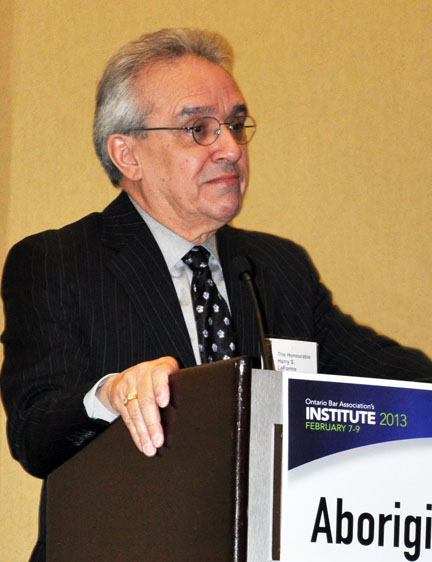The Idle No More movement “has it right,” said Ontario Court of Appeal Justice Harry LaForme in a speech at the OBA Institute’s Aboriginal law session.
 Aboriginal Canadians continue to be treated as “wards of the state,” said LaForme, the first Aboriginal appellate judge in Canada, in an impassioned speech yesterday.
Aboriginal Canadians continue to be treated as “wards of the state,” said LaForme, the first Aboriginal appellate judge in Canada, in an impassioned speech yesterday.
“In law, a ward is someone placed under the protection of a legal guardian. The state takes responsibility for the legal protection of an individual, usually a child or an incapacitated person,” he said. “In Canada, the Indian Act is the central tool by which the federal government rendered itself the authority, under s. 91(24), to completely manage the affairs of Indians, thus making hundreds of thousands of Aboriginal people wards of the federal state.”
The declaration was part of LaForme’s look into what the Idle No More movement is speaking to, particularly what’s behind the its maxim of “resetting and restoring the relationship between indigenous people and Canada.”
In a brief summary of a complex history, LaForme — a member of the Mississaugas of New Credit First Nation — said the original intent of early relationship with Aboriginals was to bring Canada’s indigenous people “as partners, as invested nations.”
But this structure began to change in the 1800, when Aboriginal people came to be seen as a barrier to economic and political gains, added LaForme, who also spoke of residential schools and officials’ desire to “kill the Indian in the child and save the man.”
After centuries, “Canada finds the Aboriginal-Canadian relationship unworkable and extremely expensive. Go figure,” he said. “The response from many quarters — and I say this sadly, regrettably — is that somehow the Aboriginal people, we are the ones to blame for the broken relationship.”
He added: “It must be understood and appreciated that this current relationship only exists because of what is universally defined as a legal fiction and a refusal to honour history.”
A reconciliation between Aboriginal and non-Aboriginal Canadians should allow for equality between them, said LaForme, noting Canada and its first inhabitants must agree on the “the rightful place of Aboriginal people.”
A resolution should also include modern treaties based on “goodwill and honest effort” that reestablish the original intent Aboriginal Canadian relationship, he added.
“Canadians, I believe, are owed nothing less. In the end, Idle No More, it would appear, has it right.”
 Aboriginal Canadians continue to be treated as “wards of the state,” said LaForme, the first Aboriginal appellate judge in Canada, in an impassioned speech yesterday.
Aboriginal Canadians continue to be treated as “wards of the state,” said LaForme, the first Aboriginal appellate judge in Canada, in an impassioned speech yesterday.“In law, a ward is someone placed under the protection of a legal guardian. The state takes responsibility for the legal protection of an individual, usually a child or an incapacitated person,” he said. “In Canada, the Indian Act is the central tool by which the federal government rendered itself the authority, under s. 91(24), to completely manage the affairs of Indians, thus making hundreds of thousands of Aboriginal people wards of the federal state.”
The declaration was part of LaForme’s look into what the Idle No More movement is speaking to, particularly what’s behind the its maxim of “resetting and restoring the relationship between indigenous people and Canada.”
In a brief summary of a complex history, LaForme — a member of the Mississaugas of New Credit First Nation — said the original intent of early relationship with Aboriginals was to bring Canada’s indigenous people “as partners, as invested nations.”
But this structure began to change in the 1800, when Aboriginal people came to be seen as a barrier to economic and political gains, added LaForme, who also spoke of residential schools and officials’ desire to “kill the Indian in the child and save the man.”
After centuries, “Canada finds the Aboriginal-Canadian relationship unworkable and extremely expensive. Go figure,” he said. “The response from many quarters — and I say this sadly, regrettably — is that somehow the Aboriginal people, we are the ones to blame for the broken relationship.”
He added: “It must be understood and appreciated that this current relationship only exists because of what is universally defined as a legal fiction and a refusal to honour history.”
A reconciliation between Aboriginal and non-Aboriginal Canadians should allow for equality between them, said LaForme, noting Canada and its first inhabitants must agree on the “the rightful place of Aboriginal people.”
A resolution should also include modern treaties based on “goodwill and honest effort” that reestablish the original intent Aboriginal Canadian relationship, he added.
“Canadians, I believe, are owed nothing less. In the end, Idle No More, it would appear, has it right.”







